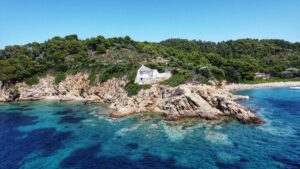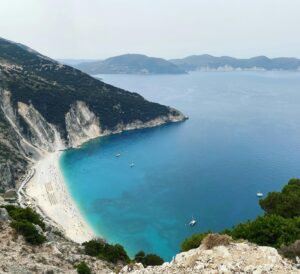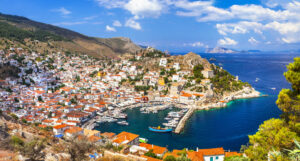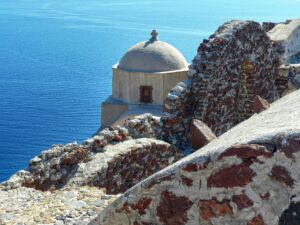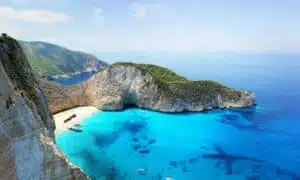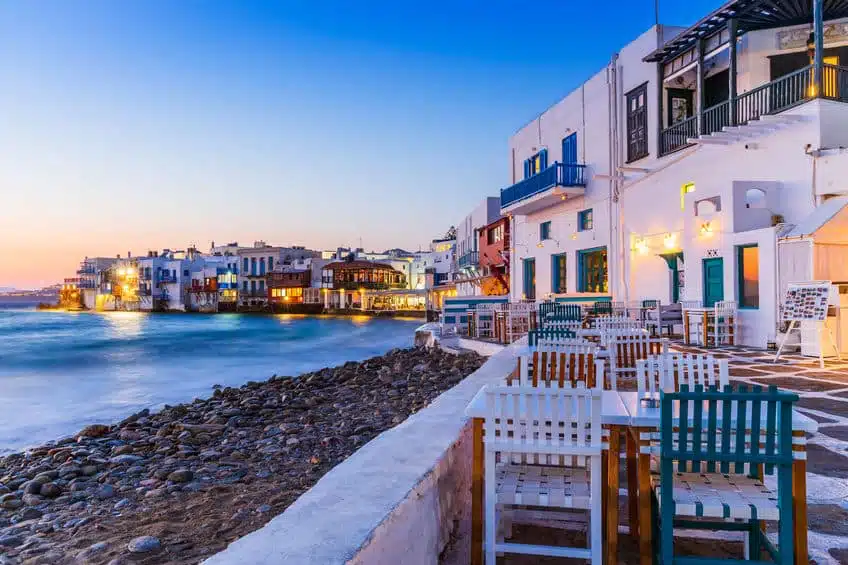
Naxos: The Cycladic island of history and nature
Naxos, the largest island in the Cyclades, enchants with its magnificent beaches, captivating history and wild nature. With its mountainous terrain and fertile valleys, it attracts adventurers and relaxation seekers alike. Remarkable sites include Portara, the remains of Apollo’s temple, and the Venetian citadel of Chora, illustrating the island’s rich past. This island offers an authentic experience where local traditions and natural landscapes coexist harmoniously.
Portara : The Symbol of Naxos
At the entrance to the port of Naxos stands the majestic Portara. This immense marble gateway is the remains of an ancient temple dedicated to Apollo. An emblematic monument, it illustrates the rich heritage of Naxos. It’s an ideal spot from which to admire the sunset. What’s more, the spectacular view over the Aegean Sea makes it a must for discovering the island’s beauty and fascinating history.
Chora: The lively life of Naxos
Chora, the capital of Naxos, seduces with its picturesque charm, a blend of Venetian and Greek influences. Its winding streets are lined with whitewashed houses, artisan stores and friendly tavernas. The Venetian fortress, dominating the town, evokes the island’s rich medieval past. In addition to its lively atmosphere, Chora is an ideal base for exploring the surrounding beaches and the fascinating archaeological sites scattered around Naxos.
Naxos Beaches: Between Relaxation and Adventure
Naxos is famous for its fine sandy beaches, considered among the most beautiful in the Cyclades. Agios Prokopios, one of the most popular, attracts visitors with its golden sands and crystal-clear waters, ideal for swimming and water sports. For those looking for tranquility, Plaka and Aliko offer secluded landscapes lined with dunes and cedars. In addition, Naxos is a popular spot for windsurfing and kitesurfing, particularly at Mikri Vigla, attracting thrill-seekers.
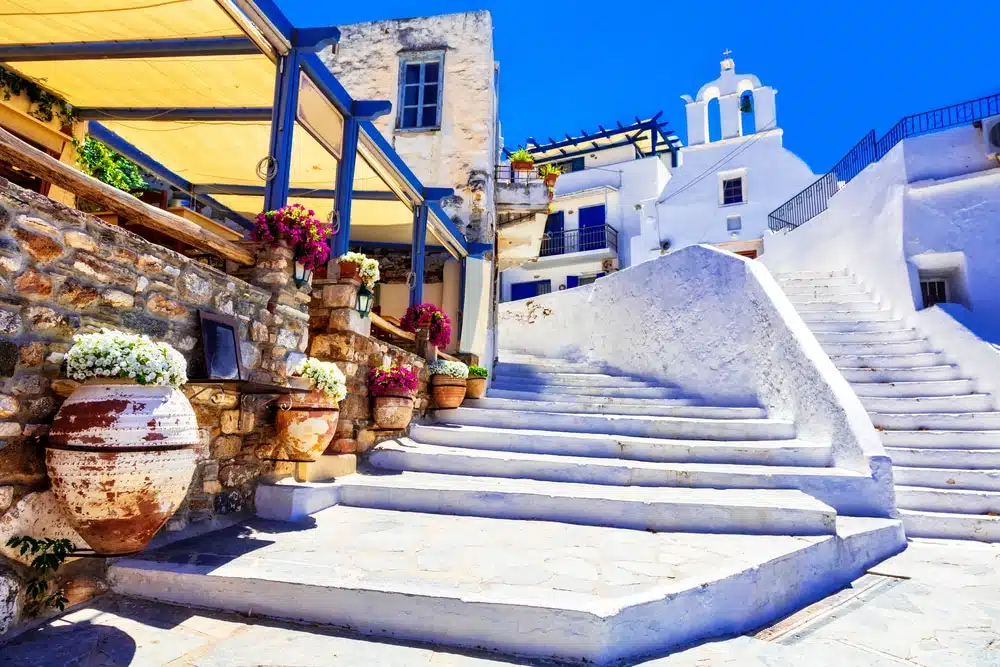
Traditional Villages: A Journey through Time
Far from the bustling coastline, the mountain villages of Naxos seem frozen in time. Apiranthos, with its marble-paved streets and stone houses, is one of the most picturesque. Halki, in the Tragea valley, charms with its olive groves and distilleries of Kitron, a local liqueur. These villages offer a glimpse of traditional life, with their shady squares, Byzantine churches and family-run tavernas. Each corner reveals a fascinating story.
Gastronomy of Naxos: Authentic Flavors of the Earth
Naxos gastronomy is characterized by simplicity and quality local ingredients. Renowned for its potatoes, the island also features cheeses such as graviera and arseniko. Lamb and goat meats are also specialties. Among the traditional dishes, moussaka and kleftiko (slow-ovened lamb) appeal to visitors’ palates. Patoudo”, a lamb dish stuffed with herbs, also deserves a mention. Visitors can also explore the vineyards of Naxos. Here, they can discover wines made from local grape varieties, offering an authentic experience.
Activities and Hiking: A Wild Island to Explore
Ideal for hiking and nature lovers, this island offers trails winding through majestic mountains and verdant valleys. You’ll discover spectacular panoramas and hidden treasures, such as Byzantine churches and ancient statues. Mount Zeus, the highest point in the Cyclades, attracts experienced hikers. The climb promises an exhilarating experience and breathtaking views of the other Cycladic islands and the Aegean Sea.
The Temple of Demeter: A Vestige of Antiquity
The Temple of Demeter, near Sangri, is a must-see archaeological site on Naxos. Dedicated to the goddess of agriculture, it underlines the island’s importance in ancient times. Although partially in ruins, its majesty remains impressive. The site offers visitors a fascinating insight into ancient architecture. A small museum nearby displays objects discovered during the excavations. It explains the site’s history and cultural significance.
Festivals and Traditions : Naxos Cultural Life
Throughout the year, Naxos celebrates its culture with a variety of traditional festivals. In July, the Dionysia Festival showcases Greek music and dance. In August, the Feast of the Transfiguration attracts large numbers of pilgrims to the church of Apeiranthos. These events offer visitors a chance to discover local folklore. They can also sample traditional dishes and take part in folk dances. The island also celebrates its agricultural roots with festivities for the olive harvest and grape harvest.
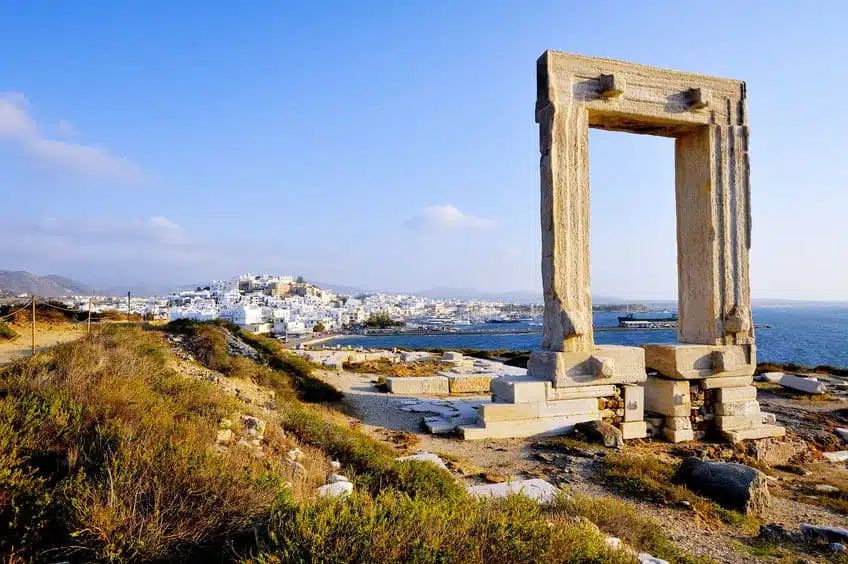
Accommodation in Naxos: Luxury and authenticity
The island offers a variety of accommodation, from luxury seaside hotels to traditional guesthouses in mountain villages. Lovers of luxury will appreciate the Naxos Island Hotel, with its sea-view rooms, private pools and spas. For an authentic experience, choose to stay in guesthouses in Apiranthos or Halki. The warm welcome of the locals will make you feel right at home.
| Athens Acropolis | Growy and Tasty | Boutique | Knossos Palace | Olive Wood | Olive Oil | The Temple of Zeus | The Parthenon | Surprise Bread | Tarama |
